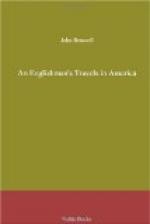I accordingly repaired to his residence at the time appointed. This was situated in one of the lateral streets of the city leading to the outskirts, and, although not large, was furnished with great taste and elegance. His lady, who was, I think, from Illinois, made herself very agreeable, her kind attentions tending to confirm the impression I already entertained of her countrywomen; they had no children, and the husband was engaged in some way with the Fur Company established in St. Louis. I was entertained with great hospitality; my kind host materially assisting me by information, &c. in my intention to pursue my route south.
He was the son of a New Englander, or native of one of the eastern states; his father having fought at Bunker’s Hill, and otherwise taken an active part in the struggle for independence, between the years 1776 and 1785. This made it the more extraordinary that he should treat an Englishman with the courtesy he showed to me, especially as under such circumstances a bias is in general handed down from father to son, which operates prejudicially to my countrymen.
After putting a variety of questions, as to the “old country” as he termed Great Britain, on which I readily satisfied his curiosity, he entered into a detail of some of the stirring events relating to the period of his father’s career in arms against the British; some of these were of a thrilling character, and strongly depicted the miseries of war, presenting a lamentable picture of the debasing influence of sanguinary struggles on the human mind. The barbarous mode of harassing the British troops, by picking off stragglers, which the lower orders of Americans pursued, in most instances for the sake of the wretched clothing and accoutrements of the victims, the former being dyed of a dark colour, and sold for a dollar per set (as he called the military suit), to the American citizen-soldiers, fairly made my blood creep; one instance in particular filled me with horror, for it was a cold-blooded murder of the deepest dye I must, however, do the narrator the justice to say that he viewed the atrocity in the same light as I did.
The occurrence I am about to relate, took place somewhere on the banks of the Hudson, below West Point, where a force of British troops were encamped or pursuing their operations under the protection of some vessels of war lying in the stream, he mentioned the exact spot where it occurred, but I have forgotten it. It appeared that this force was harassed and beset by parties of citizens, who, by pursuing a guerilla system of warfare, surprising small parties, and firing entirely in ambush, made great havoc amongst the rank and file of the invaders, almost every straggler falling a victim. One evening, during this state of things, two of the citizens, whilst prowling in a coppice, within a few miles of the camp, on the look-out, came suddenly upon an infantry soldier, who was off his guard at the moment, and whose firelock was resting




